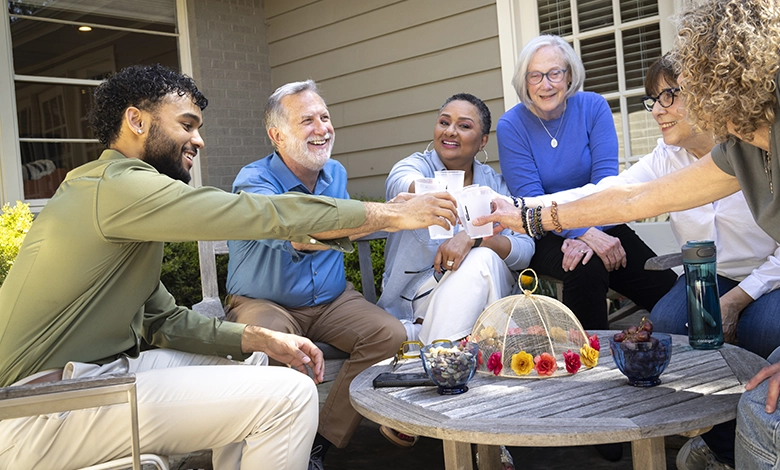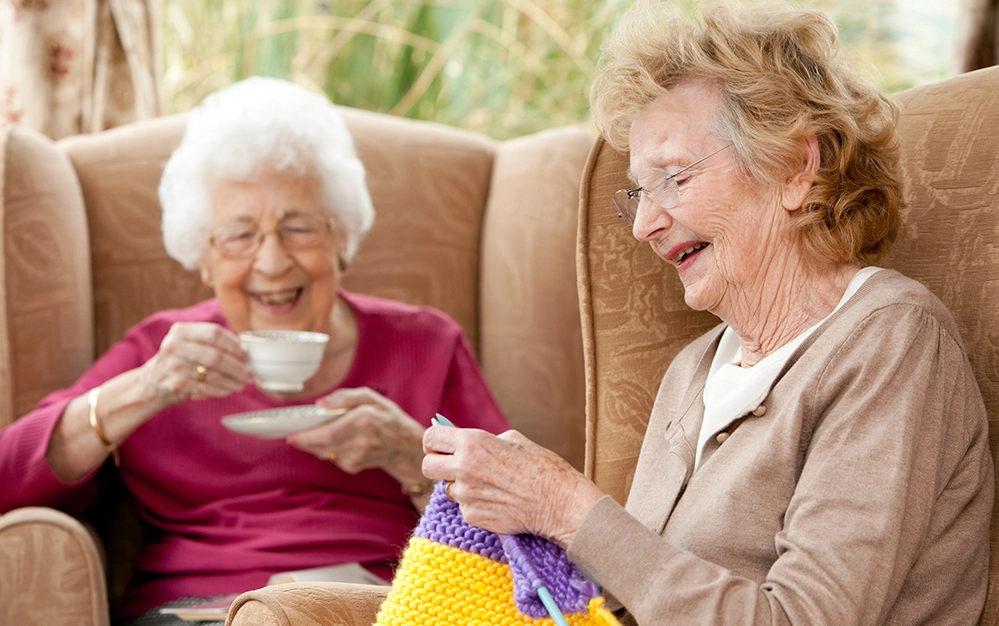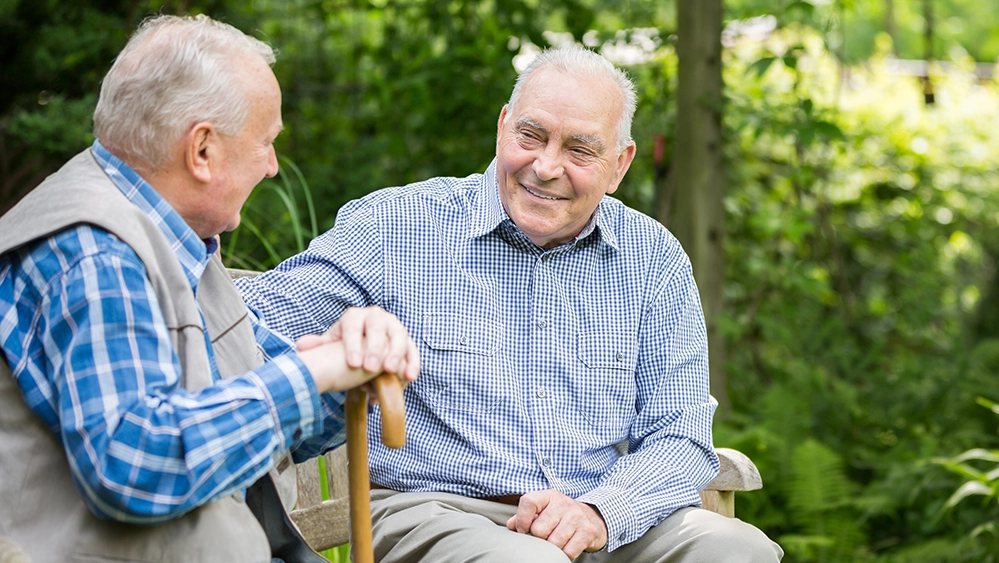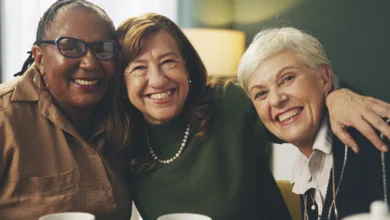
Photos by Kim Leeson.
We’ve often heard that it takes a village to raise a child. But as we grow older, we discover it also takes a village to age well. Set aside magic pills or fad diets. What if the secrets to healthy aging are found in daily interactions and authentic connections with others? Research consistently shows that strong social bonds can add years to our lives and life to our years.
Consider the connections where someone remembers your name, pulls up a chair, and asks how you’re doing.

The science behind social connection
Strong social ties and meaningful friendships boost our mood, immune system, memory, and even longevity. Researchers have been highlighting this for years. A landmark 1997 study by Dr. Sheldon Cohen found that individuals with diverse social networks were less likely to contract a common cold when exposed to a common cold virus. Friendships not only lift our spirits; they also come with an antiviral bonus!
Recent Stanford research confirms these findings, showing that strong social connections increase longevity by 50%, while UCLA researchers found that older adults with the most supportive relationships were aging one to two years slower at the DNA level than those who lacked such ties.
Social fitness—the ability to nurture and maintain meaningful relationships—is as vital to our health as physical fitness. Like building muscle, improving social strength requires repetition, engagement, and care. This kind of workout doesn’t need a gym membership, but it does demand focused attention and a willingness to engage. Over time, you’ll find yourself naturally drawn to consistent routines, like a weekly coffee date or a monthly neighborhood gathering. A sense of community quietly takes root in these rhythms as little rituals lay the foundation for a more connected lifestyle.
Here are three simple ways to strengthen your social fitness:
- Start with small, consistent gestures — like my grandmother’s Tuesday quilting circle.
- Create regular touchpoints with friends through weekly calls or coffee dates.
- Be present in everyday moments — those grocery store conversations matter more than you think.

Life lessons from my grandmother: The power of daily connection
My grandmother lived well into her 90s with grace, purpose, and a deep sense of meaningful connections. While living at home, her daily routines included reading her Bible, working in the yard, calling friends, and working on sewing projects. She attended a local church’s quilting circle on Tuesdays and was always in a pew on Sundays.
After a fall in her house, she decided moving into an assisted living residence was best. Initially, she was hesitant about the significant changes and the loss of her established routines. A few weeks later, she began looking forward to the daily social time with her friends in the community.
Senior living communities that cultivate friendship
Older adults who regularly engage in social activities tend to experience lower rates of depression and cognitive decline. Such companionship creates a ripple effect. Some modern assisted living and personal care homes feature architectural designs that promote human interaction: the dining rooms, small garden plots, and pet therapy sessions are naturally woven into personalized care and vibrant community life.
As one assisted living resident told me, “I didn’t come here expecting to make new friends at my age. We have breakfast together and talk. When we talk, we become buddies.”
Everyday relationships matter
Healthy aging through connection can flourish in everyday settings, often closer than we realize. Your circle might exist at your house of worship, the local library, or the community center where someone is always organizing a potluck. That human connection might be the neighbor you greet every morning.
These seemingly small moments? They are the heartbeat of a vibrant network.
To build your own village, start small. Reach out to one person and invite them to walk with you. Host a casual afternoon gathering. Volunteer weekly at a local charity.
When it comes to connection, consistency matters more than quantity, and you’ll soon find a few good people you can rely on. Regular engagement through weekly phone calls, monthly meetups, and even spontaneous interactions with familiar faces at the grocery store can have powerful emotional benefits.

The secret to healthy aging
The secret to healthy aging isn’t hidden in a bottle or buried in a self-help book. It’s all around us in this beautiful universe we share. You’ll find magic in smiles, conversations, laughter, listening, and showing up for each other.
Take a moment to recognize the “everyday people” who bring a little light into your world just by showing up. These caring friends check on you, share joyful moments, and offer steady companionship and quiet trust.
Aging well isn’t just about maintaining independence; it may also involve embracing interdependence—walking this path together rather than alone.
Frequently asked questions about social connection and aging
Q. How does social connection actually improve health as we age?
A. Just as Dr. Cohen’s research has shown with cold viruses, social connections can boost our immune system, reduce stress hormones, and even help prevent cognitive decline. When someone remembers your name and pulls up a chair, your body responds with measurable health benefits.
Q. What if I’m naturally introverted or shy about building relationships?
A. Connection doesn’t require being the life of the party. Small, genuine interactions—like my grandmother’s quiet sewing projects with friends—can be just as meaningful as larger social gatherings. Quality matters more than quantity.
Q. How can I build meaningful connections if I’ve recently moved or lost friends?
A. Start where you are, with what feels comfortable to you. Whether it’s a house of worship, library, or community center potluck, consistency in showing up matters more than finding the perfect group right away.

The power of holding onto each other
The circle you build, filled with shared meals, steady check-ins, and spontaneous giggles, is a lifeline. Audrey Hepburn, beloved actress and humanitarian, once said, “The best thing to hold onto in life is each other.” It’s a quote as graceful and grounded as she was and a reminder that genuine connections should never become an afterthought.
When we come together in friendship and create space for one another, we grow richer in spirit. These bonds are essential for healing, thriving, and persevering.
As the circle of connection brings daily joy and strength, the village of friends lifts us and carries us forward, often becoming one of the most meaningful parts of our lives.






